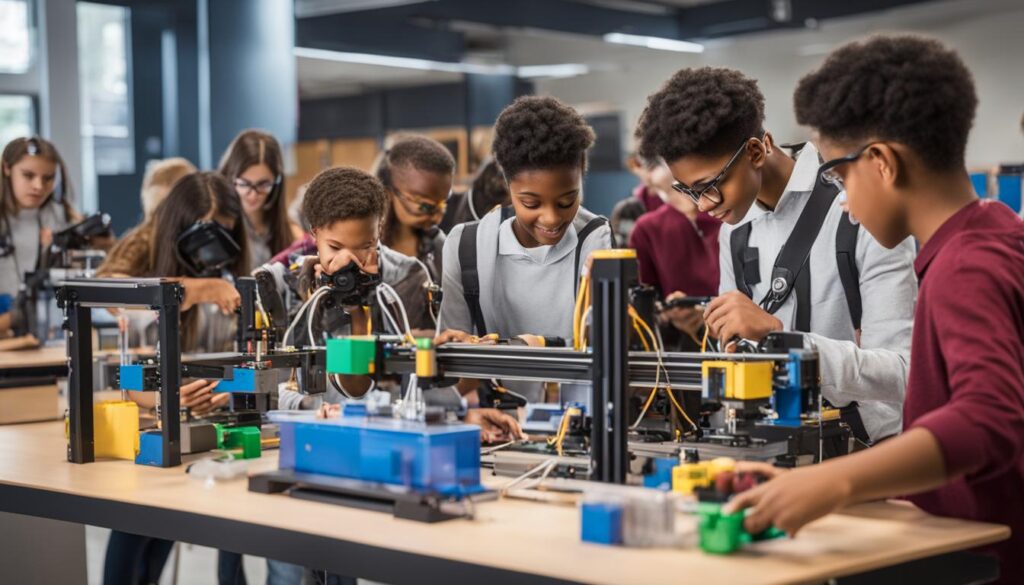Welcome to our article on nurturing talent and how top colleges play a pivotal role in fostering academic excellence. Higher education institutions around the world strive to create an environment that enables students to thrive and reach their full potential. Let’s explore how leading universities prioritize educational excellence and nurture the talent of their students.
Key Takeaways:
- Top colleges prioritize the development of skills and knowledge to foster academic excellence.
- Unique institutions offer specialized programs, mentorship, and extracurricular opportunities for talent nurturing.
- Higher education institutions focus on student well-being and life skills alongside academic success.
- Integrating well-being into the curriculum and promoting collaborative learning are critical for fostering academic excellence.
- Extracurricular activities and recognition of diverse talents enhance intellectual growth and inclusivity.
The Role of Unique Institutions in Academic Excellence
Unique institutions play a vital role in fostering academic excellence by providing students with specialized programs, competitions, mentorship, professional guidance, and extracurricular opportunities. These institutions offer focused areas of study that allow students to explore their specific interests and talents in depth. Through specialized programs, students can engage in in-depth learning experiences and receive mentorship, leading to their success in their chosen fields.
Mentorship and professional guidance programs further enhance academic excellence by providing valuable support and guidance to students. These programs help students navigate their academic and professional journeys, ensuring they have the necessary resources and guidance to excel. By fostering a strong mentorship network, unique institutions create an environment that nurtures talent and promotes personal growth.
Extracurricular opportunities also play a significant role in academic achievement. Participating in extracurricular activities not only enhances students’ skills but also fosters creativity and promotes holistic development. These activities provide students with avenues to explore their passions and interests, contributing to their overall academic success.
Higher Education Excellence: Ensuring Well-Being and Life Skills
Higher education institutions have a responsibility to not only promote academic excellence but also ensure the well-being and development of students’ life skills. The focus on well-being addresses the growing concern surrounding students’ mental health and overall quality of life. By incorporating programs and initiatives that cater to students’ well-being, higher education institutions create an environment conducive to personal growth and happiness. Similarly, fostering the development of life skills equips students with the necessary tools to navigate real-world challenges and succeed beyond academics.
The journey of higher education is not solely about intellectual growth; it encompasses holistic well-being. Recognizing the crucial role of well-being, leading universities prioritize mental health support, offer counseling services, and provide resources for students to achieve a healthy work-life balance. Institutions implement strategies to create a supportive and inclusive community, promoting a positive environment where students can thrive.
In addition to well-being, the development of life skills is an essential aspect of higher education. Life skills such as critical thinking, problem-solving, communication, and adaptability are vital for success in various professional and personal endeavors. Top colleges recognize the importance of integrating life skills development into their curriculum, offering workshops, mentorship programs, and experiential learning opportunities to enhance these essential skills.

By prioritizing well-being and fostering life skills development, higher education institutions pave the way for students to lead fulfilling and successful lives. The focus on well-being ensures that students have the necessary support systems in place to thrive academically and personally. Moreover, equipping students with life skills prepares them to face real-world challenges, enhancing their employability and overall quality of life.
Integrating Wellbeing into the Curriculum
Integrating wellbeing into the curriculum is a crucial aspect of fostering academic excellence. By prioritizing the holistic development of students, educational institutions create an environment that promotes positive mental health and overall wellbeing.
Positive education, rooted in positive psychology principles, plays a significant role in this integration. It focuses on nurturing students’ wellbeing alongside their academic growth, ensuring a balanced approach to education.
Case studies have shown the successful implementation of wellbeing initiatives in schools and universities. These initiatives include mindfulness programs, stress management workshops, and social-emotional learning curricula, among others.
Positive psychology in academic settings has proven to have numerous benefits. It enhances students’ self-awareness, resilience, and emotional intelligence, enabling them to navigate challenges effectively and thrive in their educational journey.
Furthermore, there has been a global shift towards prioritizing self-discovery and wellbeing alongside knowledge delivery. Recognizing the importance of holistic development in students, educational institutions are now incorporating wellbeing into their curriculum to prepare students for success in all aspects of life.
The integration of wellbeing into the curriculum not only supports students’ mental health but also fosters a positive and inclusive learning environment. It equips students with the skills and tools needed to thrive academically, emotionally, and socially.
Extracurricular Activities: Catalysts for Intellectual Growth
Engaging in extracurricular activities is not only a way to have fun and socialize but also a powerful catalyst for intellectual growth and academic achievement. These activities provide students with opportunities to explore new interests, develop critical thinking skills, and enhance their overall cognitive abilities. By participating in extracurricular activities, you can broaden your horizons, challenge yourself, and gain valuable skills that go beyond the traditional classroom setting.
Extracurricular activities offer a diverse range of options to suit different interests and talents. Whether you join a debate club to sharpen your argumentative skills, participate in a robotics team to enhance your problem-solving abilities, or engage in community service projects to develop empathy and leadership qualities, each activity contributes to your intellectual growth in unique ways.
These activities foster interdisciplinary learning, encouraging you to apply knowledge from various subjects to real-life situations. For example, participating in a science fair not only deepens your understanding of scientific concepts but also improves your presentation and communication skills as you explain your project to judges and peers.
Furthermore, extracurricular activities promote critical thinking and creative problem-solving by presenting you with challenges and opportunities to think outside the box. Whether you are brainstorming ideas for a theater production, designing a sustainable engineering project, or devising strategies for a sports team, these activities enhance your ability to analyze, innovate, and adapt in different contexts.
Participating in extracurricular activities also cultivates valuable soft skills such as teamwork, effective communication, time management, and resilience. Collaborating with peers, managing responsibilities, and overcoming obstacles help you develop essential qualities that are highly valued in academic and professional settings.
In addition to the immediate benefits, extracurricular activities contribute to your long-term intellectual growth by fostering a lifelong love for learning. When you pursue activities that align with your interests and passions, you are more likely to develop a curious mindset and a thirst for knowledge. This intellectual curiosity extends beyond the boundaries of your academic curriculum and fuels a continuous quest for self-improvement and personal development.
Therefore, it’s important to embrace extracurricular activities as valuable opportunities for intellectual growth and holistic development. Whether you choose to explore the arts, sports, community service, or any other activity that sparks your interest, remember that these experiences offer much more than just enjoyment—they are catalysts that propel you toward academic excellence and a well-rounded education.
Recognizing and Developing Diverse Talents
In order to foster academic excellence and promote inclusivity, it is crucial for higher education institutions to recognize and develop diverse talents. Every student possesses unique abilities and talents that deserve recognition and support. By identifying and nurturing these diverse talents, universities and colleges can create an environment that provides equal opportunities for all students to excel and contribute to the academic community.
Recognizing Diverse Talents:
- Implement inclusive talent recognition programs to identify and acknowledge a wide range of talents, including academic achievements, leadership abilities, artistic skills, and more.
- Promote a culture of diversity and inclusion, valuing different backgrounds, perspectives, and experiences to create an enriching learning environment.
- Partner with organizations and community leaders to identify underrepresented talent and provide them with the necessary resources and support to nurture their skills and passions.
Developing Diverse Talents:
- Offer personalized learning experiences that cater to individual strengths and interests, allowing students to delve deeper into their areas of talent and expertise.
- Provide mentorship and guidance programs to support students in honing their talents, helping them set and achieve their goals, and connecting them with industry professionals.
- Offer diverse extracurricular activities that foster the development of well-rounded individuals, encouraging students to explore diverse interests and develop skills beyond their academic pursuits.
By recognizing and developing diverse talents, higher education institutions can create a vibrant and inclusive academic community that celebrates the unique contributions of each student.

Collaborative Learning and Peer Mentorship
Collaborative learning and peer mentorship are integral to fostering academic excellence and holistic development within leading universities. By creating a community of learners, these institutions cultivate a culture of collaboration where students have the opportunity to learn from and support one another. Through teamwork and effective communication, students enhance their understanding of course material and develop essential interpersonal skills that are crucial for success in both academic and professional domains.
Collaborative learning involves group-based activities that encourage active engagement and knowledge sharing among students. By working together on projects, assignments, and discussions, students gain a deeper understanding of the subject matter and expand their perspectives through exposure to diverse viewpoints. This collaborative approach not only promotes critical thinking and problem-solving skills but also enhances teamwork capabilities, a valuable trait in today’s interconnected world.
Peer mentorship, on the other hand, allows experienced students to guide and support their peers in their academic journey. Mentors serve as role models and provide valuable insights, advice, and encouragement to mentees, helping them navigate challenges and make informed decisions. Through this mentorship relationship, mentees benefit from the guidance of someone who has already experienced the academic system and can provide valuable tips and strategies for success.
The benefits of collaborative learning and peer mentorship extend beyond academic achievement. By participating in group activities and mentorship programs, students also develop crucial communication and interpersonal skills that are highly sought after in the professional world. They learn how to effectively express their ideas, actively listen to others, and work collaboratively in diverse teams, mirroring the dynamics of real-world work environments.
In summary, collaborative learning and peer mentorship have a transformative impact on student development, fostering academic excellence and promoting teamwork and communication skills. The integration of these practices within leading universities creates an environment that facilitates knowledge sharing, nurtures social connections, and prepares students for success in their future careers.
Advancements in STEM Education and Research
STEM education and research are at the forefront of driving advancements in various fields, shaping the future of academic excellence. As technology continues to evolve and new discoveries are made, the importance of promoting STEM disciplines cannot be overstated.
STEM education encompasses science, technology, engineering, and mathematics, and it plays a crucial role in preparing students for the modern workforce. By providing students with a strong foundation in these disciplines, STEM education equips them with the knowledge and skills required to thrive in a rapidly changing world.
One of the key advancements in STEM education is the integration of hands-on learning experiences. Students are encouraged to actively engage with real-world problems, applying their knowledge to find innovative solutions. This approach fosters critical thinking, problem-solving abilities, and a deep understanding of STEM concepts.
Moreover, advancements in technology have transformed the way STEM subjects are taught. Virtual and augmented reality tools, simulation software, and online learning platforms have revolutionized the learning experience, allowing students to explore complex concepts in interactive and immersive ways.
“STEM education opens doors to exciting career opportunities and empowers students with the skills needed to shape the future.” – Dr. Jane Thompson, STEM Education Researcher
In addition to STEM education, research in STEM fields is driving groundbreaking discoveries and advancements. From medical breakthroughs to technological innovations, STEM research is pushing the boundaries of human knowledge and understanding.
The advancements in STEM research have led to improvements in various sectors, including healthcare, renewable energy, and artificial intelligence. Scientists and researchers are constantly pushing the limits, exploring new frontiers, and uncovering solutions to global challenges.

The image above visually represents the dynamic nature of STEM education and research, showcasing the interconnectedness of the different STEM fields and their impact on society and technological advancements.
In conclusion, the advancements in STEM education and research are revolutionizing the way we learn, innovate, and solve complex problems. By promoting STEM disciplines and providing students with cutting-edge opportunities for learning and research, we can foster academic excellence and shape a brighter future.
Driving Force of Social Entrepreneurs in Education
Social entrepreneurs and successful professionals play a crucial role in driving excellence in education. Through their philanthropic efforts and dedication, they contribute to fostering academia and providing educational opportunities for aspiring students. The symbiotic relationship between philanthropy and education is evident, as successful professionals leverage their resources and expertise to create a positive impact in the educational landscape.
These social entrepreneurs understand the transformative power of education and strive to make it accessible to all. They establish foundations, endowments, and scholarship programs to support students from diverse backgrounds and ensure equal opportunities for success. By investing in education, they empower individuals to overcome barriers and unlock their full potential.
“Education is the most powerful weapon which you can use to change the world.” – Nelson Mandela
Inspired by their own experiences, successful professionals often dedicate themselves to improving educational systems and institutions. They collaborate with educators, policymakers, and administrators to develop innovative approaches that enhance learning outcomes and foster academic excellence. Their expertise in various fields and industries brings real-world relevance to classroom teachings, preparing students for the challenges and opportunities they will encounter in their careers.

Furthermore, social entrepreneurs drive innovation in education by introducing new models and initiatives. They champion entrepreneurship and creativity, encouraging students to think critically, solve problems, and pursue their passions. By fostering academia, these individuals create a culture of lifelong learning and curiosity that extends beyond the traditional boundaries of education.
Through their unwavering commitment to philanthropy and education, social entrepreneurs and successful professionals shape the future of academia. They inspire and empower the next generation of leaders, changemakers, and problem solvers, ultimately driving the pursuit of knowledge and excellence in education.
Addressing the Challenge of Accessibility and Inclusion
Ensuring accessibility and inclusion in education is crucial for fostering academic excellence. It is essential to bridge the gap for underprivileged students and promote equal access to quality education. Various initiatives aim to address this challenge and create a level playing field for all students.
Financial support plays a significant role in ensuring accessibility for underprivileged students. Scholarships and grants provide much-needed financial assistance, enabling deserving students to pursue their educational goals without being hindered by financial constraints.
Adapting to Global Educational Demands Post-Pandemic
The COVID-19 pandemic has brought about unprecedented challenges in the field of education, forcing educational institutions to adapt to the evolving demands of a post-pandemic world. As the world grapples with the aftermath of the pandemic, the education landscape has undergone significant transformations to ensure continued academic excellence.
During the pandemic, educational institutions faced numerous obstacles, including the sudden shift to remote learning, limited access to resources and facilities, and the need to prioritize the health and safety of students and staff. However, these challenges have also sparked innovation and led to the adoption of innovative approaches and strategies.
One key aspect of educational adaptation has been the widespread implementation of online learning platforms and technologies. Institutions have embraced digital platforms to deliver educational content, facilitate virtual classrooms, and provide interactive learning experiences. This shift has opened up new avenues for accessing education, allowing students and educators to overcome geographical barriers and engage in remote learning.
Additionally, the pandemic has prompted a focus on mental health and well-being within educational settings. Institutions have invested in student support services, such as counseling and mental health resources, to address the emotional impact of the pandemic on students. Recognizing the importance of holistic well-being, educational institutions have integrated well-being initiatives into their curriculum, ensuring the overall development and resilience of students.
The pandemic has also highlighted the need for flexible and personalized learning approaches. Educational institutions have adopted adaptive learning technologies and tailored instructional methods to meet the diverse needs of students. Personalized learning pathways provide students with individualized support and opportunities for self-paced learning, enhancing their educational experience.
To ensure equity and inclusivity, institutions have prioritized providing resources and support for marginalized and underprivileged students. Financial aid programs, scholarships, and technology initiatives have been implemented to bridge the digital divide and address the educational needs of students from disadvantaged backgrounds.
In summary, the COVID-19 pandemic has spurred educational institutions to adapt and innovate in order to meet the global educational demands in a post-pandemic world. By embracing online learning, prioritizing mental health and well-being, implementing personalized learning approaches, and fostering equity and inclusivity, educational institutions are paving the way for a resilient and inclusive education system.
Conclusion
In summary, nurturing talent and fostering academic excellence are paramount goals for higher education institutions. By implementing various initiatives such as personalized learning, integrating well-being, promoting extracurricular activities, and recognizing diverse talents, top colleges create an environment that supports holistic development and empowers students to realize their full potential.
Furthermore, as education continues to evolve in response to global demands, higher education institutions must adapt to meet the challenges and opportunities of a post-pandemic world. Prioritizing accessibility and inclusion is crucial in ensuring equal access to quality education for all students, regardless of their background or financial circumstances. By embracing these principles and forging a path of educational excellence, higher education institutions can shape the future of academia.
In conclusion, higher education institutions play a significant role in nurturing talent and fostering academic excellence. By providing a conducive environment, personalized learning experiences, and a range of support systems, these institutions empower students to thrive academically and personally. Through ongoing innovation, adaptability, and a commitment to inclusivity, higher education institutions can continue to make a lasting impact on the academic landscape, preparing students to excel in their chosen fields and contribute positively to society.
FAQ
How do top colleges foster academic excellence?
Top colleges foster academic excellence by providing a conducive environment for students to thrive and reach their full potential. They offer specialized programs, mentorship, and extracurricular opportunities that promote in-depth learning, skill development, and holistic growth.
What role do unique institutions play in fostering academic excellence?
Unique institutions such as specialized programs and competitions play a vital role in fostering academic excellence. They provide students with opportunities to explore their specific interests and talents, offering mentorship and professional guidance to excel in their chosen fields.
How do higher education institutions ensure well-being and life skills?
Higher education institutions prioritize well-being by incorporating programs and initiatives that cater to students’ mental health and overall quality of life. They also foster the development of life skills, equipping students with the necessary tools to navigate real-world challenges and succeed beyond academics.
How is well-being integrated into the curriculum?
Well-being is integrated into the curriculum through positive education, rooted in positive psychology principles. This approach promotes well-being and positive mental health within academic settings, providing students with a balanced focus on self-discovery, well-being, and knowledge delivery.
What is the importance of extracurricular activities in fostering academic excellence?
Extracurricular activities play a significant role in fostering intellectual growth, enhancing academic achievement, and promoting holistic development. They provide students with opportunities to explore new interests, develop critical thinking skills, and enhance their overall cognitive abilities.
Why is it important to recognize and develop diverse talents in higher education institutions?
Recognizing and developing diverse talents is essential in fostering academic excellence and promoting inclusivity. Every student possesses unique talents and abilities that deserve recognition and support, ensuring equal opportunities for all students to excel and contribute to the academic community.
How do collaborative learning and peer mentorship promote academic excellence?
Collaborative learning and peer mentorship create a culture of collaboration within leading universities, where students learn from and support each other. This fosters teamwork, effective communication, and fosters academic excellence through shared knowledge and mutual support.
What are the advancements in STEM education and research that drive academic excellence?
STEM education and research drive academic excellence by shaping the future of various fields. They offer cutting-edge opportunities for learning and research, promoting innovation and advancements that contribute to academic excellence.
How do social entrepreneurs and successful professionals contribute to fostering academic excellence?
Social entrepreneurs and successful professionals play a crucial role in fostering academia through philanthropic efforts and dedication. They contribute to providing educational opportunities for aspiring students, shaping the future of education and driving excellence in higher learning.
How can education ensure accessibility and inclusion for all students?
Education addresses the challenge of accessibility and inclusion through initiatives that bridge the gap for underprivileged students. This includes providing financial support and scholarships to level the playing field and promote equal access to quality education.
How have educational institutions adapted to global demands post-pandemic?
Educational institutions have adapted to global demands post-pandemic by adopting innovative approaches and strategies. They have focused on ensuring continued academic excellence through online learning, hybrid models, and implementing safety measures to meet the evolving demands of education.
Source Links
- https://www.edweek.org/teaching-learning/opinion-nurturing-talent-how-the-u-s-succeeds/2010/03
- https://www.linkedin.com/pulse/nurturing-studentss-talents-skills-joonify-teachers-guide-joonify
- https://www.ncbi.nlm.nih.gov/pmc/articles/PMC8931502/

